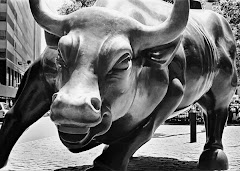Riding The Business Cycle
For the smart ones, they know that the equity market is too.JPG) hot. It is like setting historical record everyday and large daily fluctuation has been accepted. Coupled with rising oil price to near historical high in today’s dollar value plus US housing slump, only idiots will ignore the likely consequence. Now I have more friends asking me about bonds. To those who studied accounting or finance, or people working in finance (or related) sector, it is nothing complex. But to many retail investors, it may not sound easy. And I had been talking about using bonds to protect our earning in times of economic downturn, i.e. the down swing of the business cycle. This is the time when we need to exit from equity and to place our earnings into other defensive assets that have negative correlation with the economy yet yielding reasonable returns at the same time. Otherwise, you will see your stocks and equity fund plunging thus returning all your years of earnings back to Ms Market. Remember, protecting your earning is more important than anything else. 不要白忙一场。
hot. It is like setting historical record everyday and large daily fluctuation has been accepted. Coupled with rising oil price to near historical high in today’s dollar value plus US housing slump, only idiots will ignore the likely consequence. Now I have more friends asking me about bonds. To those who studied accounting or finance, or people working in finance (or related) sector, it is nothing complex. But to many retail investors, it may not sound easy. And I had been talking about using bonds to protect our earning in times of economic downturn, i.e. the down swing of the business cycle. This is the time when we need to exit from equity and to place our earnings into other defensive assets that have negative correlation with the economy yet yielding reasonable returns at the same time. Otherwise, you will see your stocks and equity fund plunging thus returning all your years of earnings back to Ms Market. Remember, protecting your earning is more important than anything else. 不要白忙一场。
“But I thought as a follower of Warren Buffett, our investment horizon should be like indefinite?”
Unfortunately as a retail investor, we are unable to do exactly what Warren Buffett has been doing. We don’t even have a hundred thousand cash in bank. There are so many things Warren Buffett can do that we can’t. For example, we can’t buy over a company and not even a significant stake. We shall use Warren Buffett’s strategy but intelligently. Understand our limitation and be flexible in formulating our strategy is the key to success.
So to protect our earnings, if we are expecting a downturn, we need to switch our money from equity to fixed income instruments. These are assets that provides steady annual returns and, generally, with capital protection. I will explain why I used the word “generally” later. A bond is a fixed income security.
What Is A Bond?
Bonds are basically loans, and you are the lender. Companies or government need to borrow money to fund their projects and you lend it to them. These borrowers promise to return back your money in full at maturity date. This means that if the “contract” says that ABC Pte Ltd borrows $10,000 from you for 5 years, at the end of the fifth year, $10,000 will be returned back to you. Along the way, the bond price may fluctuate but that is none of their problem. In addition, the borrower will also promise to pay the bondholders a fee yearly or half yearly without fail. You may call this fee as interest but the official term is “coupon”. Nothing comes for free in this world. Note that we take this word “without fail” very seriously because if a borrower fails to deliver its promise, it has defaulted and there is a serious repercussion. I’ll come back to this point later. The following are some of the terminologies that you should know:
or government need to borrow money to fund their projects and you lend it to them. These borrowers promise to return back your money in full at maturity date. This means that if the “contract” says that ABC Pte Ltd borrows $10,000 from you for 5 years, at the end of the fifth year, $10,000 will be returned back to you. Along the way, the bond price may fluctuate but that is none of their problem. In addition, the borrower will also promise to pay the bondholders a fee yearly or half yearly without fail. You may call this fee as interest but the official term is “coupon”. Nothing comes for free in this world. Note that we take this word “without fail” very seriously because if a borrower fails to deliver its promise, it has defaulted and there is a serious repercussion. I’ll come back to this point later. The following are some of the terminologies that you should know:
1) Maturity period. This is the period of the loan stated on the paper. But if you purchase the bond from the open market, then you need to know the remaining life from the date of your purchase to its expiry date.
2) Coupon rate. This is a FIXED rate (you can call it interest rate) stated on the paper. Rain or shine, the borrower must honour it otherwise it has defaulted.
3) Yield. Yield is the actual returns of investing in a bond. I repeat, your actual returns is the yield, not the coupon rate. This should be your main focus if you are investing in bonds.
Who Are The Issuers?
Generally, bonds are issue by the government (e.g. local municipal, government agencies) or companies. Take note that for corporate bonds, we usually call it “debentures”. But for simplicity sake, throughout my articles, I’ll just use the word bond. Let’s say that both the government and a company issue a bond with same maturity period, is the coupon rate going to be the same? If not, which one should have a higher or lower rate? Given a choice, where would you park your money? Well, you don’t need an MBA in finance to answer this question. If comparing on apple-to-apple basis, obviously money lend to the government is the safest. Your decision may only change if the company offers a much higher coupon rates for a similar bond. So you now know that if the government and a company issues bond with the same characteristics, then the corporate bonds must come with higher coupon rate otherwise nobody is going to take it up.
“So you mean buying government bond has zero risk?”
Well, generally it should be but sometimes “xxx” happens. In August 1998, a financial crisis hit Russia (also called "Rouble crisis") just a year after Asian Financial Crisis. While Asian Financial Crisis circled around huge currency devaluation, Russian’s Financial Crisis was ignited by commodity prices. The decline in world commodity prices then hit countries that depend heavily on the export of raw materials, such as oil. As petroleum, natural gas, metals, and timber accounted for more than 80% of Russian exports, the country was vulnerable to swings in world prices. The sharp decline in the oil price and non-payment of taxes by the energy and manufacturing industries had severe consequences for Russia. This caused the Russian Government to default on their bonds. One of the victims was Long-Term Capital Management which I mentioned in my previous article on hedge funds.
But generally, and especially in Singapore context, it is very safe to lend your money to the government. I am willing to put my head on it. Seriously, do you really think that Singapore Government need to borrow from you to finance their project? Singapore is one (and may be the only one) of the countries that have zero national debts. Many years ago, my lecturer used to tell us “our government never borrow, they only lend”. Referring to the MAS website, it will tell you that Singapore Government issues bond not because they need it, but to develop and nurture the bond market in Singapore. (Shouldn’t they nominate me for National Day Award?)
“Is there other easier and more objective method for me to assess the risk of a bond?”
Yes there is – by looking at the credit-rating of a bond.
To be continue……
For the smart ones, they know that the equity market is too
.JPG) hot. It is like setting historical record everyday and large daily fluctuation has been accepted. Coupled with rising oil price to near historical high in today’s dollar value plus US housing slump, only idiots will ignore the likely consequence. Now I have more friends asking me about bonds. To those who studied accounting or finance, or people working in finance (or related) sector, it is nothing complex. But to many retail investors, it may not sound easy. And I had been talking about using bonds to protect our earning in times of economic downturn, i.e. the down swing of the business cycle. This is the time when we need to exit from equity and to place our earnings into other defensive assets that have negative correlation with the economy yet yielding reasonable returns at the same time. Otherwise, you will see your stocks and equity fund plunging thus returning all your years of earnings back to Ms Market. Remember, protecting your earning is more important than anything else. 不要白忙一场。
hot. It is like setting historical record everyday and large daily fluctuation has been accepted. Coupled with rising oil price to near historical high in today’s dollar value plus US housing slump, only idiots will ignore the likely consequence. Now I have more friends asking me about bonds. To those who studied accounting or finance, or people working in finance (or related) sector, it is nothing complex. But to many retail investors, it may not sound easy. And I had been talking about using bonds to protect our earning in times of economic downturn, i.e. the down swing of the business cycle. This is the time when we need to exit from equity and to place our earnings into other defensive assets that have negative correlation with the economy yet yielding reasonable returns at the same time. Otherwise, you will see your stocks and equity fund plunging thus returning all your years of earnings back to Ms Market. Remember, protecting your earning is more important than anything else. 不要白忙一场。“But I thought as a follower of Warren Buffett, our investment horizon should be like indefinite?”
Unfortunately as a retail investor, we are unable to do exactly what Warren Buffett has been doing. We don’t even have a hundred thousand cash in bank. There are so many things Warren Buffett can do that we can’t. For example, we can’t buy over a company and not even a significant stake. We shall use Warren Buffett’s strategy but intelligently. Understand our limitation and be flexible in formulating our strategy is the key to success.
So to protect our earnings, if we are expecting a downturn, we need to switch our money from equity to fixed income instruments. These are assets that provides steady annual returns and, generally, with capital protection. I will explain why I used the word “generally” later. A bond is a fixed income security.
What Is A Bond?
Bonds are basically loans, and you are the lender. Companies
 or government need to borrow money to fund their projects and you lend it to them. These borrowers promise to return back your money in full at maturity date. This means that if the “contract” says that ABC Pte Ltd borrows $10,000 from you for 5 years, at the end of the fifth year, $10,000 will be returned back to you. Along the way, the bond price may fluctuate but that is none of their problem. In addition, the borrower will also promise to pay the bondholders a fee yearly or half yearly without fail. You may call this fee as interest but the official term is “coupon”. Nothing comes for free in this world. Note that we take this word “without fail” very seriously because if a borrower fails to deliver its promise, it has defaulted and there is a serious repercussion. I’ll come back to this point later. The following are some of the terminologies that you should know:
or government need to borrow money to fund their projects and you lend it to them. These borrowers promise to return back your money in full at maturity date. This means that if the “contract” says that ABC Pte Ltd borrows $10,000 from you for 5 years, at the end of the fifth year, $10,000 will be returned back to you. Along the way, the bond price may fluctuate but that is none of their problem. In addition, the borrower will also promise to pay the bondholders a fee yearly or half yearly without fail. You may call this fee as interest but the official term is “coupon”. Nothing comes for free in this world. Note that we take this word “without fail” very seriously because if a borrower fails to deliver its promise, it has defaulted and there is a serious repercussion. I’ll come back to this point later. The following are some of the terminologies that you should know:1) Maturity period. This is the period of the loan stated on the paper. But if you purchase the bond from the open market, then you need to know the remaining life from the date of your purchase to its expiry date.
2) Coupon rate. This is a FIXED rate (you can call it interest rate) stated on the paper. Rain or shine, the borrower must honour it otherwise it has defaulted.
3) Yield. Yield is the actual returns of investing in a bond. I repeat, your actual returns is the yield, not the coupon rate. This should be your main focus if you are investing in bonds.
Who Are The Issuers?
Generally, bonds are issue by the government (e.g. local municipal, government agencies) or companies. Take note that for corporate bonds, we usually call it “debentures”. But for simplicity sake, throughout my articles, I’ll just use the word bond. Let’s say that both the government and a company issue a bond with same maturity period, is the coupon rate going to be the same? If not, which one should have a higher or lower rate? Given a choice, where would you park your money? Well, you don’t need an MBA in finance to answer this question. If comparing on apple-to-apple basis, obviously money lend to the government is the safest. Your decision may only change if the company offers a much higher coupon rates for a similar bond. So you now know that if the government and a company issues bond with the same characteristics, then the corporate bonds must come with higher coupon rate otherwise nobody is going to take it up.
“So you mean buying government bond has zero risk?”
Well, generally it should be but sometimes “xxx” happens. In August 1998, a financial crisis hit Russia (also called "Rouble crisis") just a year after Asian Financial Crisis. While Asian Financial Crisis circled around huge currency devaluation, Russian’s Financial Crisis was ignited by commodity prices. The decline in world commodity prices then hit countries that depend heavily on the export of raw materials, such as oil. As petroleum, natural gas, metals, and timber accounted for more than 80% of Russian exports, the country was vulnerable to swings in world prices. The sharp decline in the oil price and non-payment of taxes by the energy and manufacturing industries had severe consequences for Russia. This caused the Russian Government to default on their bonds. One of the victims was Long-Term Capital Management which I mentioned in my previous article on hedge funds.
But generally, and especially in Singapore context, it is very safe to lend your money to the government. I am willing to put my head on it. Seriously, do you really think that Singapore Government need to borrow from you to finance their project? Singapore is one (and may be the only one) of the countries that have zero national debts. Many years ago, my lecturer used to tell us “our government never borrow, they only lend”. Referring to the MAS website, it will tell you that Singapore Government issues bond not because they need it, but to develop and nurture the bond market in Singapore. (Shouldn’t they nominate me for National Day Award?)
“Is there other easier and more objective method for me to assess the risk of a bond?”
Yes there is – by looking at the credit-rating of a bond.
To be continue……



